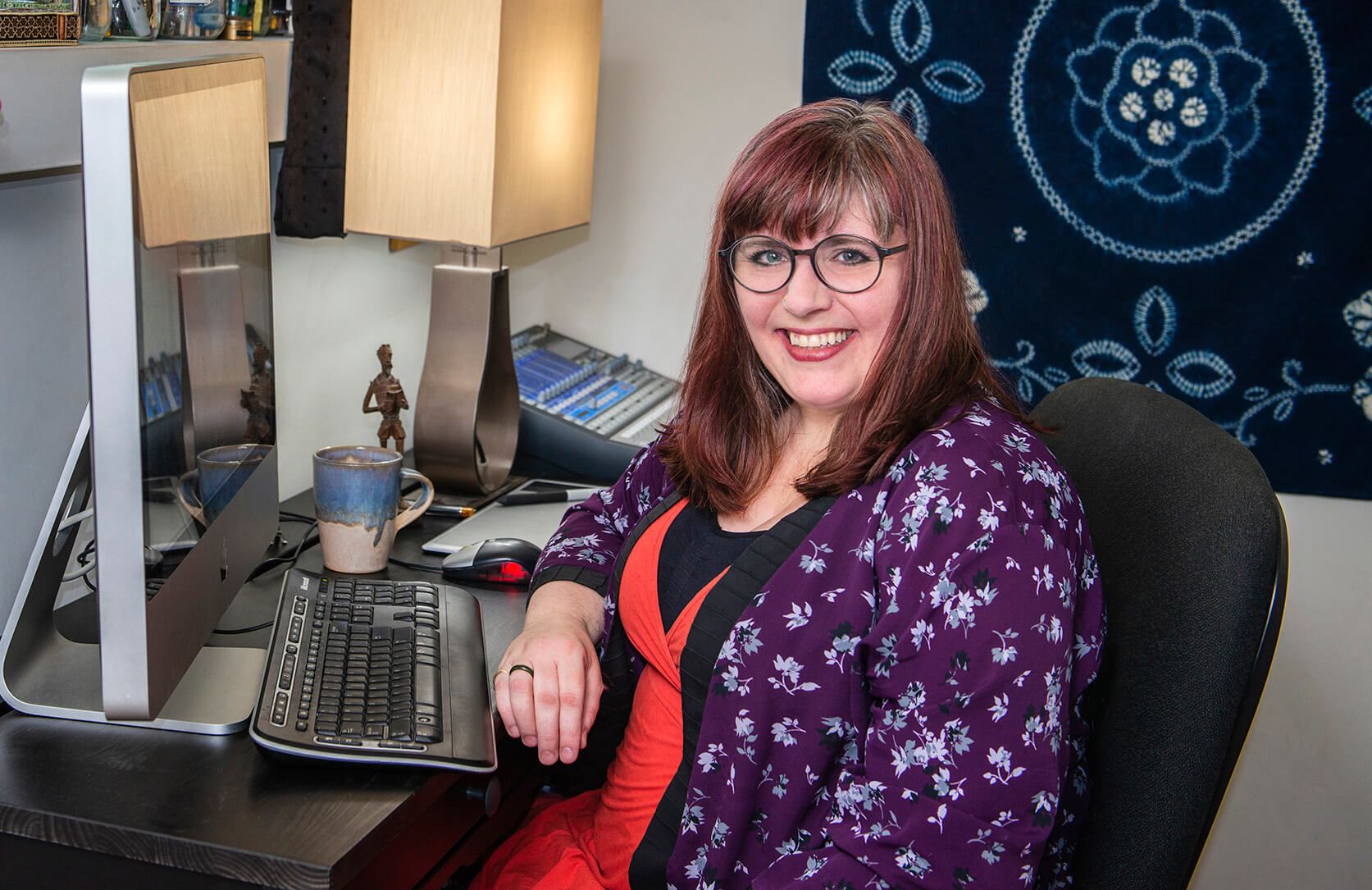Unstoppable, relentless, forward progression – the 2018 Future Alumni Award recipient
Fiona Smith, AU’s 2018 Future Alumni award recipient, wears many hats and impressively never backs down from a fight with disease, disability, or academics.
Fiona Smith was born and raised in a small village near London, England before moving to Canada at age 12.
She lived a tortured life, literally, having been abused repeatedly growing up and welcomed the move to Canada. But mere months after arriving in Toronto, Ontario, her father packed up and left.
“Here we were in Canada and had to decide if we would stay or move back to England,” Fiona explains. “My brother and I begged my mom to let us stay because we liked school here.”
They stayed, yet it’s ironic Fiona professed love for school, as she unknowingly struggled with dyslexia, making school-work incredibly difficult for her.
“I never thought I was stupid, I just thought that I wasn’t trying hard enough,” Fiona says, recalling how she studied every weekend, just to get by.
She squeaked into university with mediocre grades and struggled academically in her first year before an instructor realized her efforts didn’t equal her results. Fiona was tested for dyslexia, which came back positive, along with dyscalculia—the equivalent of dyslexia, but with numbers.
Things finally began to make sense and Fiona was taught different tools and content management techniques at the University of Manitoba, while using a Mac computer to help work with and around her dyslexia. Eventually she earned an undergraduate degree in theatre and English.
Fiona was the first in her family to get a university degree—even with dyslexia and bouts of PTSD due to childhood trauma—and soon, she’ll be the first to do a master’s.
“By all stretches of the imagination, statistically, I should be on the streets dealing drugs and my children should be in foster care. But that’s not what happened because I stayed in school.”
Education is the answer
Her mother, with little formal education, repeatedly told Fiona that school would save her; don’t give up. Fiona listened and her life soared.
She wrote and directed theatre shows in university and for her town; taught English in Japan; had a son in Japan; came back to Winnipeg and ran a home daycare; reunited with her childhood sweetheart and married; moved to Ontario; had a daughter; became a volunteer firefighter in Parry Sound, Ontario; became a municipal employee in land-use and planning; worked as a fitness instructor/manager at YMCA; ran 10 kilometers each day; was accepted into the University of Manitoba’s Bachelor of Education program to become a high school teacher; and then was stung by a wasp and everything changed.
Fiona developed Systemic Mastocytosis in October 2007, from that wasp sting. It is a rare, incurable, cellular disease that causes repeated, life-threatening anaphylactic reactions—503 for Fiona as of the date of the article’s interview—due to elements including scents, dust, latex, and certain foods.
She gave up her job, university placement, running, fire fighting, driving, farming her small patch of land, leading theatre programs, socializing in person, and leaving her house—unless absolutely necessary.
Fiona became listless and depressed.

Advocating on behalf of others
“My husband said, ‘There are things you can do, honey,’ pointing me in the direction of Athabasca University,” Fiona says. “He suggested, ‘Why don’t you go back to school and do what you want to do; you’re just going to have to change how you want to do it.’ ”
Meanwhile, Fiona was battling a two-and-a-half-year disability claim. Long-term disability payments need a confirmed diagnosis, but Fiona didn’t have one yet. Innovatively and justifiably, she appealed her claim with a latex allergy, considering she goes into anaphylaxis simply by entering a room where latex has been at one point.
Fiona won the first case in Canada, arguing it all by herself, and set a precedent for CPP disability claims with a latex allergy.
“It was so stressful; I had no money, and we ended up living on credit,” she says, wondering if it was that hard for everyone who became disabled.
“By the time you’ve gone through that whole process, you need every cent (you’ve won) because you’ve racked up so much debt,” Fiona explains, noting disability advocacy agencies take a significant percentage of your settlement if you use their services.
She decided to volunteer her time, taking no fees, to help others with disability claims. She has a 100 percent success (case win) rate, to date.
Fiona also decided to impact change on the few too many blank stares she got during hospital visits. It was unnerving, so she co-founded the Mastocytosis Society Canada roughly a year after her wasp sting. The Society has a website with resources for patients, caregivers, and health-care professionals to better-understand and treat this debilitating disease.
Being house-bound doesn’t prevent Fiona from volunteering to help fellow disability claim applicants, or newcomers, refugees, and immigrants hoping to learn English, or those who need support building their resume.
She also uses her paintings, a hobby that helps her PTSD, to support Gas Station Art Centre’s annual Girls! Girls! Girls! Fundraiser, while her poetry won third place in Athabasca University’s “Journal of Integrated Studies” contest, to be published this fall.
When Fiona completes her Master of Education in Distance Education at Athabasca University, she hopes to be considered employable.
“I just want to keep helping people. I would like to have a career where I can keep doing that and teach in the capacity that I get to do it. It feels like a calling.”
– Fiona Smith